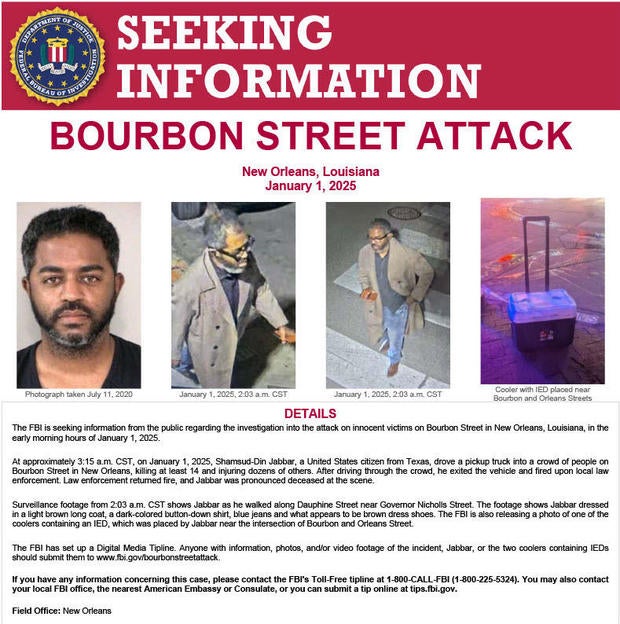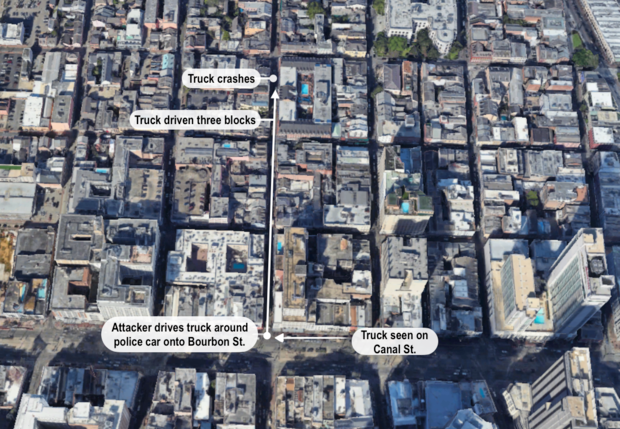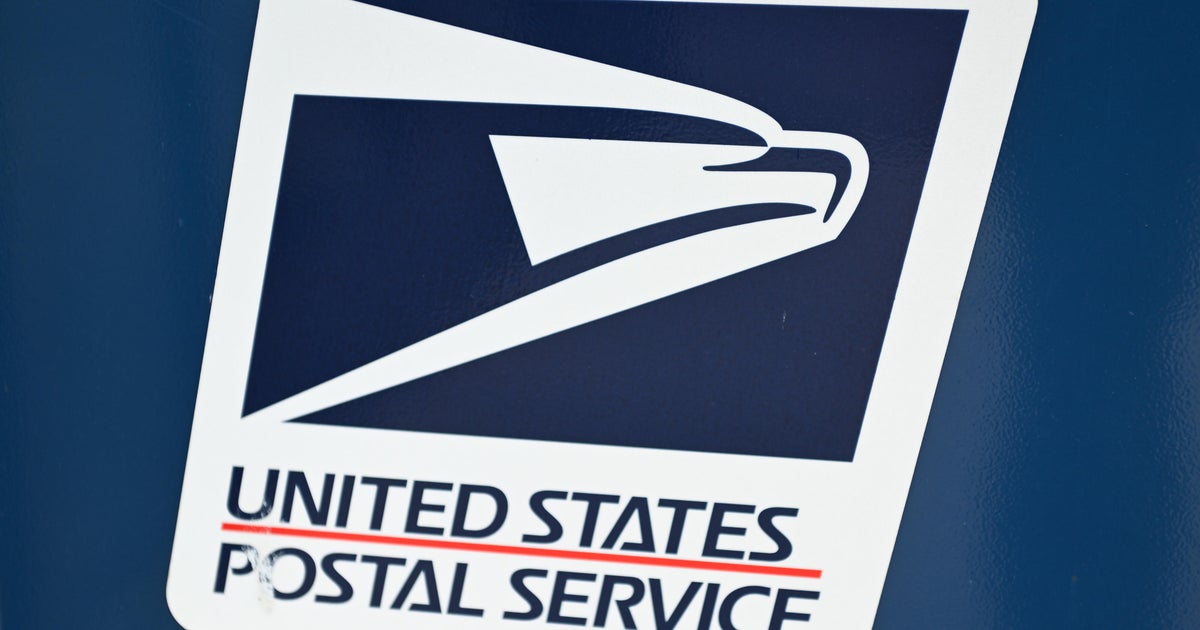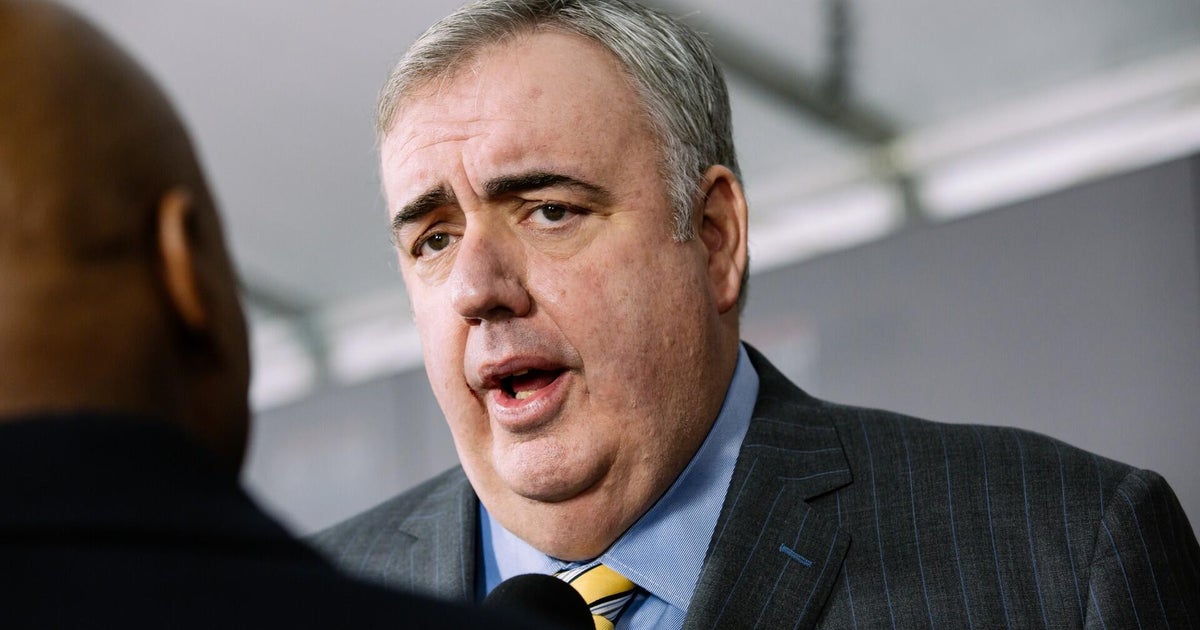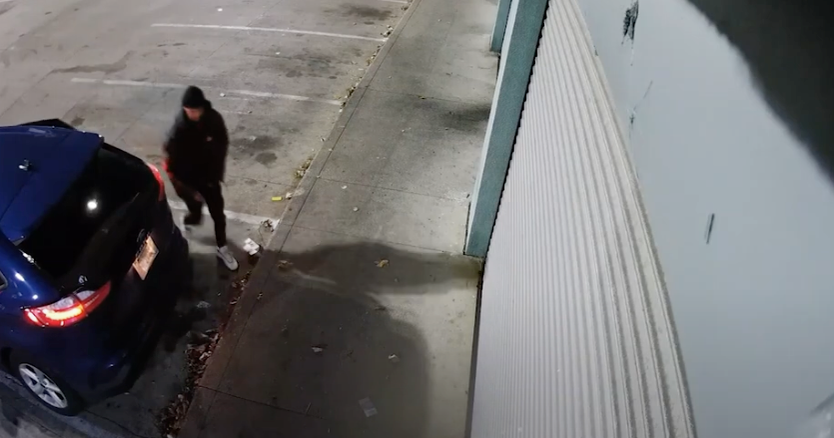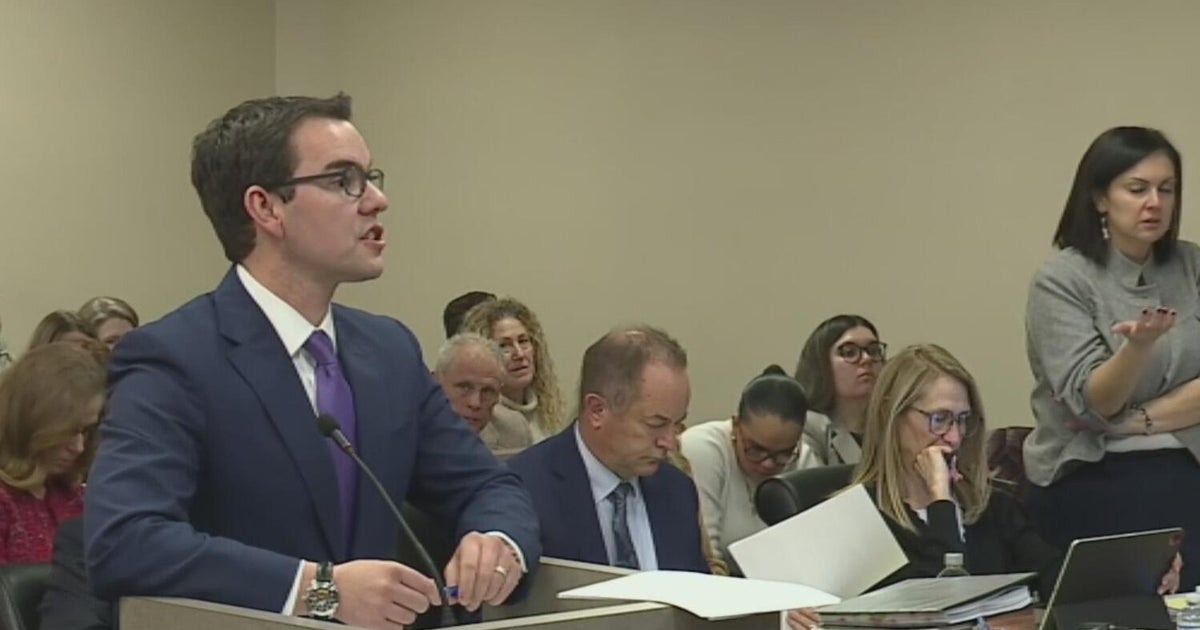New Orleans attacker posted videos declaring support for ISIS shortly before rampage, FBI says
The investigation into the truck attack on New Orleans' Bourbon Street continued Thursday after a driver plowed into a crowd of New Year's Day revelers, killing at least 14 people and injuring dozens more. The attacker posted videos declaring his support for ISIS shortly before the deadly rampage, the FBI said Thursday.
The driver of the truck, who was shot and killed by police moments after he drove into the crowd, was identified as Shamsud-Din Jabbar, a 42-year-old U.S.-born citizen from Texas. He had previously served in the U.S. military, including an 11-month deployment to Afghanistan, according to an Army spokesperson. He was discharged in 2015 and worked in real estate in recent years. His most recent address was in Houston.
The FBI initially said that 15 people, excluding the driver, died in the attack. The number was revised by the New Orleans coroner's office on Thursday to say that the figure included the attacker.
Investigators are continuing to search for a motive. Officials repeatedly said on Wednesday and Thursday that they thought Jabbar may have had help with the attack, but a U.S. official with the investigation told CBS News late Thursday morning that the FBI now believes there were no accomplices.
"At this point, currently, and this is another fact I want to be clear on, we do not assess at this point that anyone else is involved in this attack except Shamsud-Din Jabbar," deputy assistant director of the FBI's counterintelligence division Christopher Raia said in a news conference on Thursday.
The FBI urged anyone with information or video from the scene to share it with investigators.
Jabbar had rented a Ford electric pickup truck from the peer-to-peer rental app Turo. Raia said Jabbar picked up the car in Houston on Dec. 30, 2024, and drove to New Orleans on Dec. 31. Raia said the attacker had posted five videos while driving between the two cities. President Biden referenced the videos in televised remarks Wednesday evening. In the videos, the man proclaimed his support for ISIS and said he had joined the terror organization before this summer, Raia said.
In one of those videos, he said that he had planned to attack family and friends, but "was concerned the news headlines would not focus on the quote, 'war between the believers and the disbelievers,' end quote," Raia said.
Early Wednesday morning, just hours after New Orleans had rung in 2025, authorities say Jabbar drove onto the sidewalk of Bourbon Street, swerving around barriers, to drive into a crowd of revelers. He then got out of the car and began firing at police officers. He died after exchanging gunfire with three responding officers, the FBI said. The New Orleans Police Department said he was struck by police fire and declared dead at the scene.
"100% inspired by ISIS"
Raia said it's not clear why Jabbar decided to attack Bourbon Street, but said he was "100% inspired by ISIS" and said the investigation into his motive for the attack was ongoing.
Jabbar's brother, Abdur-Rahim Jabbar, told CBS News that his brother was raised Muslim but left the religion for many years and only recently returned to his faith. He also said his brother told him a recent divorce was very tough on him financially. The two even stayed in the same house after the divorce because Jabbar couldn't afford his own place, the brother said.
There have been many conflicting reports of improvised explosive devices, or IEDs, found at the scene and in the French Quarter. Raia said that two devices were found in the French Quarter. Both devices were active and were found in coolers near intersections in the area. Both were "rendered safe" where they were found, Raia said. Surveillance footage showed Jabbar placing the devices where they were found, Raia said.
A person familiar with the investigation told CBS News that the devices were rudimentary pipe bombs that contained shrapnel including nails, screws and tacks.
President Biden said Thursday that the FBI had told him there was a remote detonator in the vehicle.
Raia said that investigators found two other items of interest that were determined not to be IEDs. He said there have been reports of other devices, but said those reports are misinformation or were for non-functioning devices.
"We do not believe the public is in any danger around any of these locations," Raia said.
Two law enforcement sources told CBS News that Jabbar had an AR-15-style weapon and a handgun with him at the time of the attack. Law enforcement sources had described one of the weapons as a long gun with a suppressive device acting as a silencer. Investigators are looking into whether Jabbar illegally acquired the weapons. He was also wearing body armor, according to two sources familiar with the investigation.
Investigators have recovered three phones and two laptops, Raia said. Those devices are being reviewed, he said. Evidence technicians will also continue to go over the truck, Raia said. He said investigators have also conducted "hundreds of interviews" in relation with the attack.
"There's nothing to indicate through call records, through anything on those devices, through interviews, through anything in our systems, that he was aided in this attack by anybody," Raia said.
Raia said Bourbon Street had been released as a crime scene, and it reopened by mid-day. The Sugar Bowl college football game between Notre Dame and Georgia, which was postponed by a day, was played without interruption Thursday evening.
Raia also said that "at this point, there is no definitive link between the attack here in New Orleans and the one in Las Vegas," where a Tesla Cybertruck exploded outside of the Trump Towers hotel Wednesday morning.
Both attacks used vehicles rented through Turo, and both attacks involved U.S.-born military servicemen who had served in Afghanistan around the same time, though two U.S. officials told CBS News that they have found no overlap between the two men. Turo said in a statement Wednesday that they believe neither renter "had a criminal background that would have identified them as a security threat."
